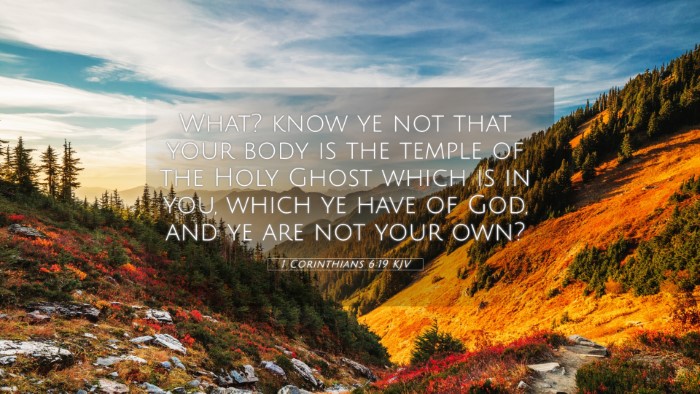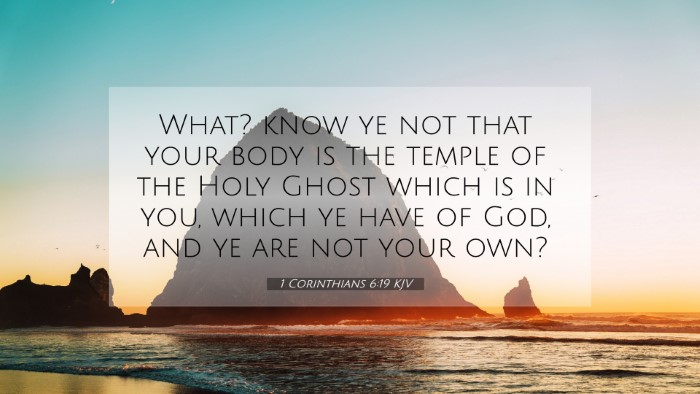Understanding 1 Corinthians 6:19
1 Corinthians 6:19 states, "Or do you not know that your body is a temple of the Holy Spirit within you, whom you have from God? You are not your own." This verse speaks profoundly about the value and sanctity of the human body as it relates to God’s presence and purpose in believers' lives.
Verse Meaning Overview
The apostle Paul emphasizes several key points in this passage:
- Indwelling of the Holy Spirit: The body is referred to as the temple of the Holy Spirit, indicating that God's Spirit dwells within believers. This brings a need for reverence and honor towards one's body.
- Divine Ownership: The verse clearly states that individuals do not belong to themselves but are God’s possession—a theme that speaks to surrender and commitment to His service.
- Moral Responsibility: Recognizing this sacred relationship calls for a lifestyle of holiness and purity as a response to the indwelling Spirit.
Commentary Insights
Matthew Henry's Commentary
Matthew Henry elaborates on the concept of the body being a temple, indicating that rather than solely a physical dwelling, it symbolizes a sacred place where God communes with His followers. Henry argues that this understanding should inspire believers to avoid any behaviors that defile this temple.
Albert Barnes' Notes
Albert Barnes emphasizes the idea that since the Holy Spirit lives in the believer, the body must be treated with respect. Barnes points out that the implications are profound as they align with the moral obligations that come from recognizing God's ownership over oneself.
Adam Clarke's Commentary
Adam Clarke's perspective adds a contextual layer, suggesting that the Corinthians were perhaps undervaluing the importance of their physical lives in relation to spiritual matters. Clarke urges a comprehensive understanding of how spiritual truths should resonate in practical lifestyles.
Cross-References and Connections
1 Corinthians 6:19 connects with several other biblical texts that reinforce its messages:
- 1 Peter 1:16: "You shall be holy, for I am holy." - This emphasizes the call to holiness reflecting God's nature.
- Romans 12:1: "Present your bodies as a living sacrifice, holy and acceptable to God." - Highlighting the need for bodily sanctification in service to God.
- Galatians 5:16-17: Discusses living by the Spirit versus the desires of the flesh, reinforcing life in alignment with the Spirit’s presence.
- Ephesians 2:19-22: Describes believers as part of God's household, which relates to the notion of spiritual unity and sacred purpose.
- 2 Timothy 1:14: "By the Holy Spirit who dwells within us, guard the good deposit entrusted to you." - This shows the responsibility of safeguarding the Spirit's influence.
- John 14:17: Refers to the Holy Spirit living with the believers, further establishing the theme of divine indwelling.
- Matthew 5:14-16: Calls believers to shine as lights, a metaphor that connects to the presence of the Holy Spirit producing good works in front of others.
Thematic Connections
The themes of possession, sanctity, and divine purpose weave through multiple biblical narratives. The idea of belonging to God parallels other scriptures, illustrating a consistent biblical theme regarding the relationship between God and His followers.
Exploring the Greater Context
In understanding 1 Corinthians 6:19, it is crucial to consider its context within Paul’s broader teachings. The Corinthian church faced significant challenges regarding moral behavior and identity in Christ. By asserting that their bodies were temples, Paul called them to a higher standard of living, urging them to reflect their faith in every aspect of their lives.
Conclusion
1 Corinthians 6:19 not only informs believers of their sacred identity through the Holy Spirit but also establishes deep theological connections across scripture. Recognizing that we are not our own, but belong to God, compels believers to lead lives that honor this divine relationship.
Further Study Recommendations
For those interested in exploring cross-referencing and studying these themes further, consider using:
- Bible concordance for locating related verses
- Bible cross-reference guides for in-depth exploration
- Online Bible study tools for thematic inquiry
- Accessing comprehensive Biblical reference resources for sermon preparation and teaching
This verse invites continuous reflection and application, urging believers to understand their identity as vessels of the Holy Spirit, encouraging them to live in a way that brings glory to God.















